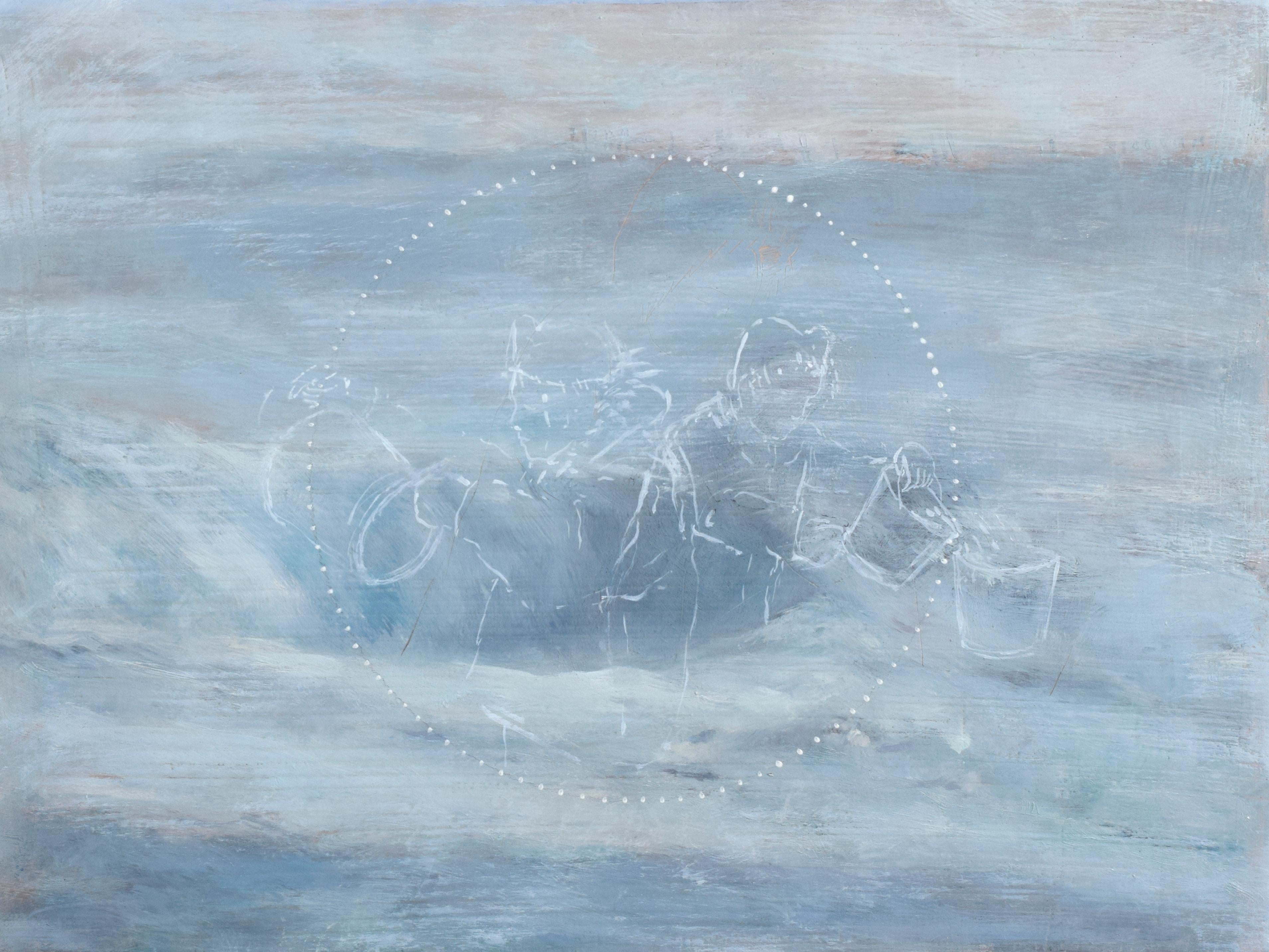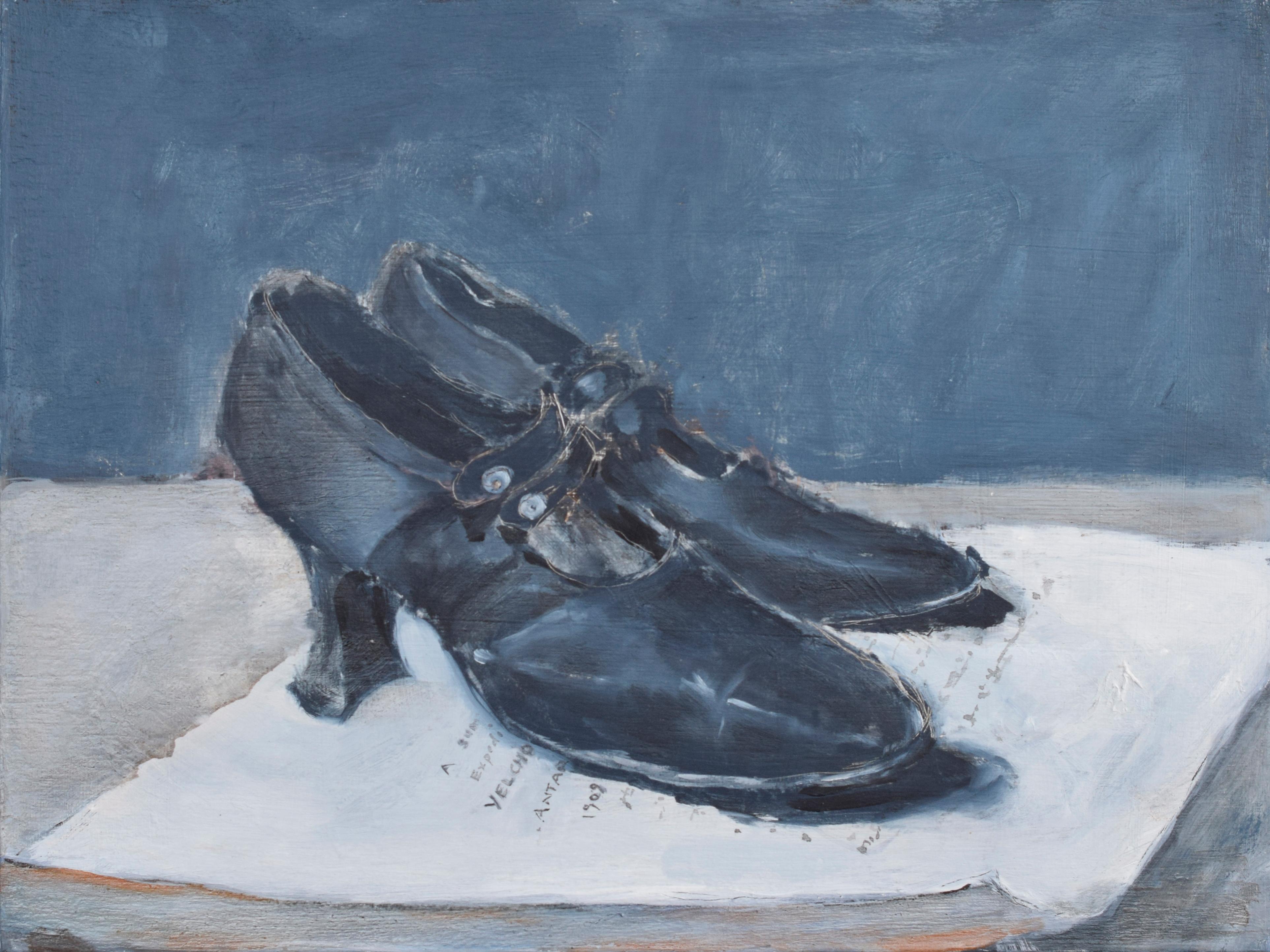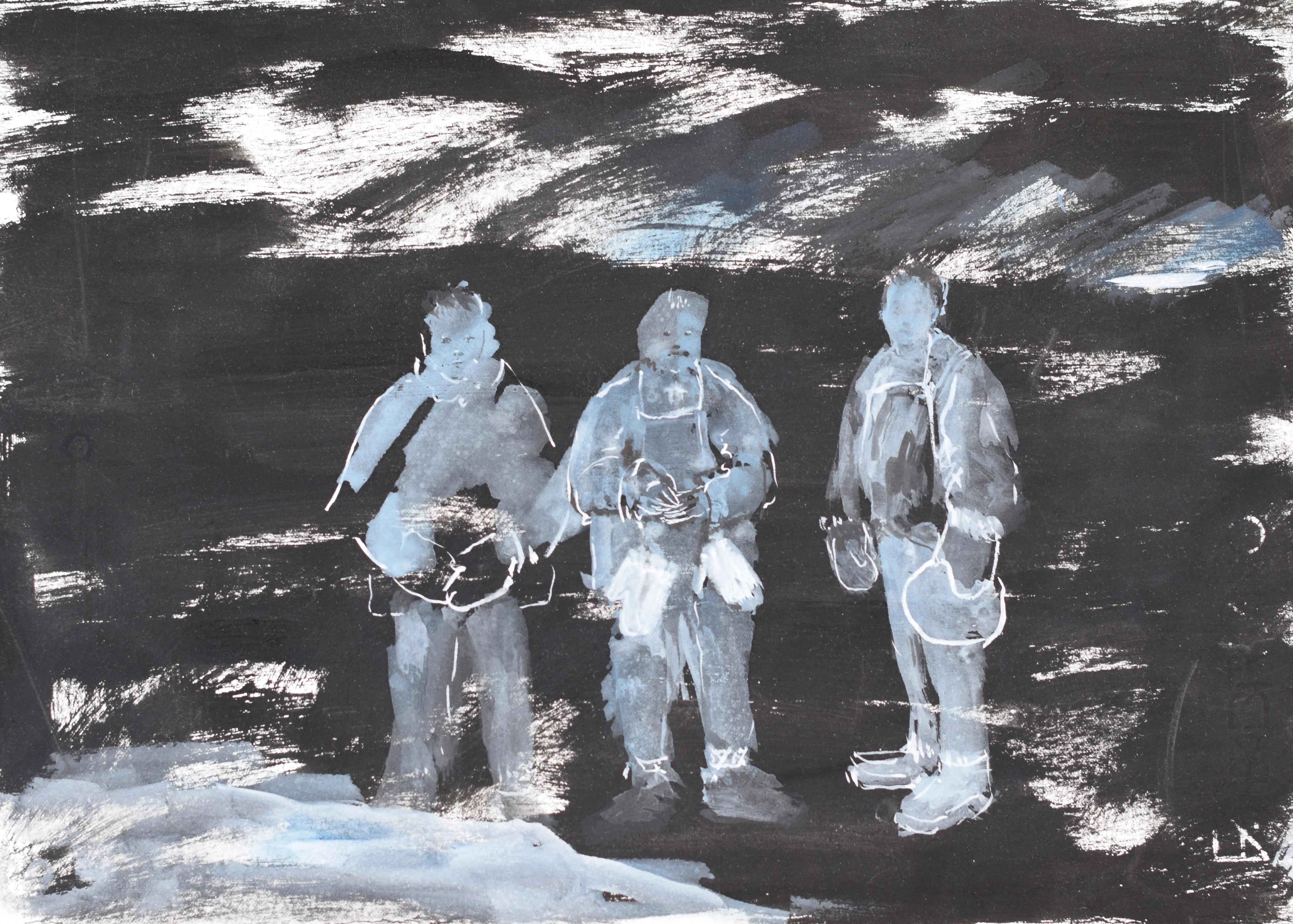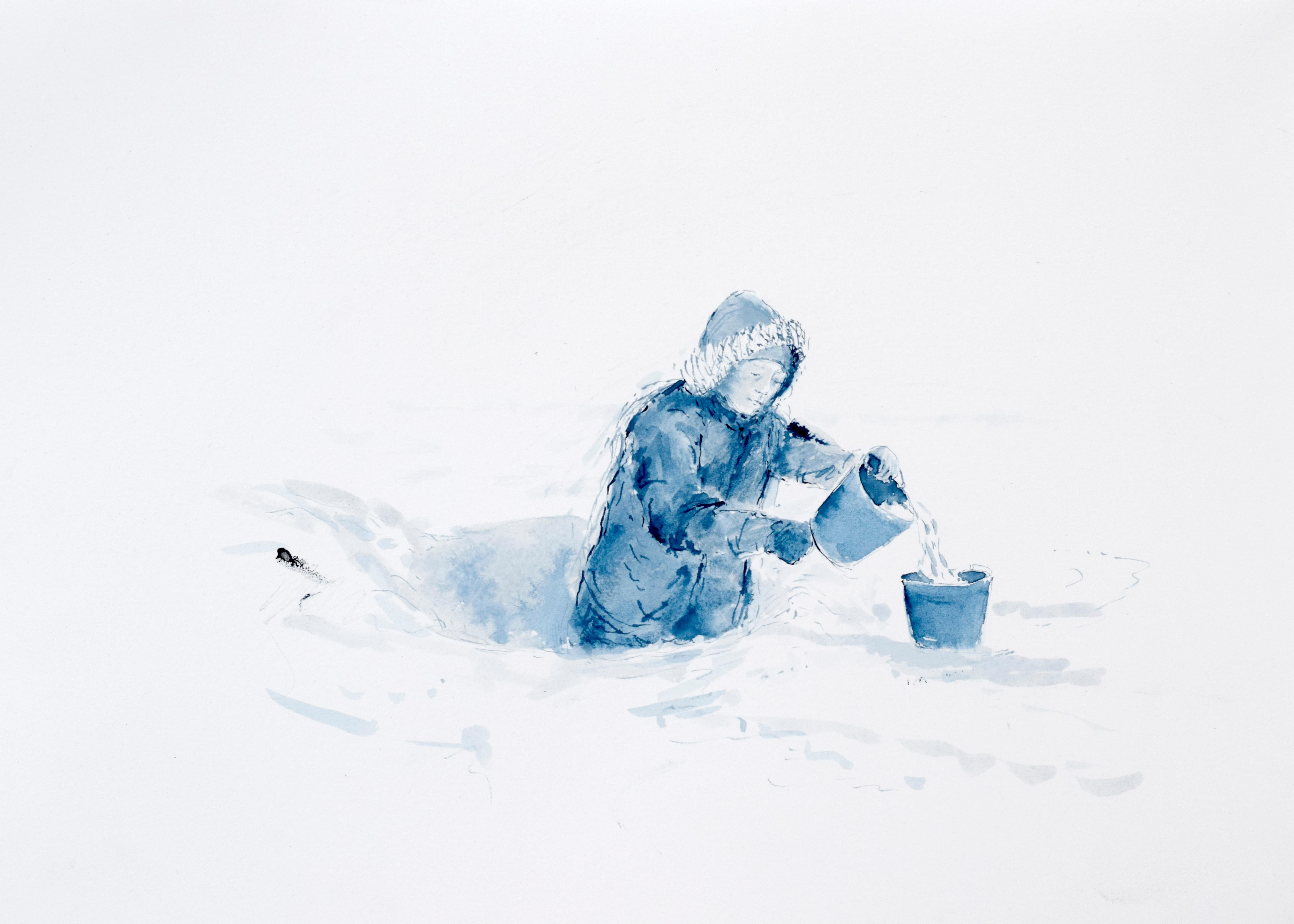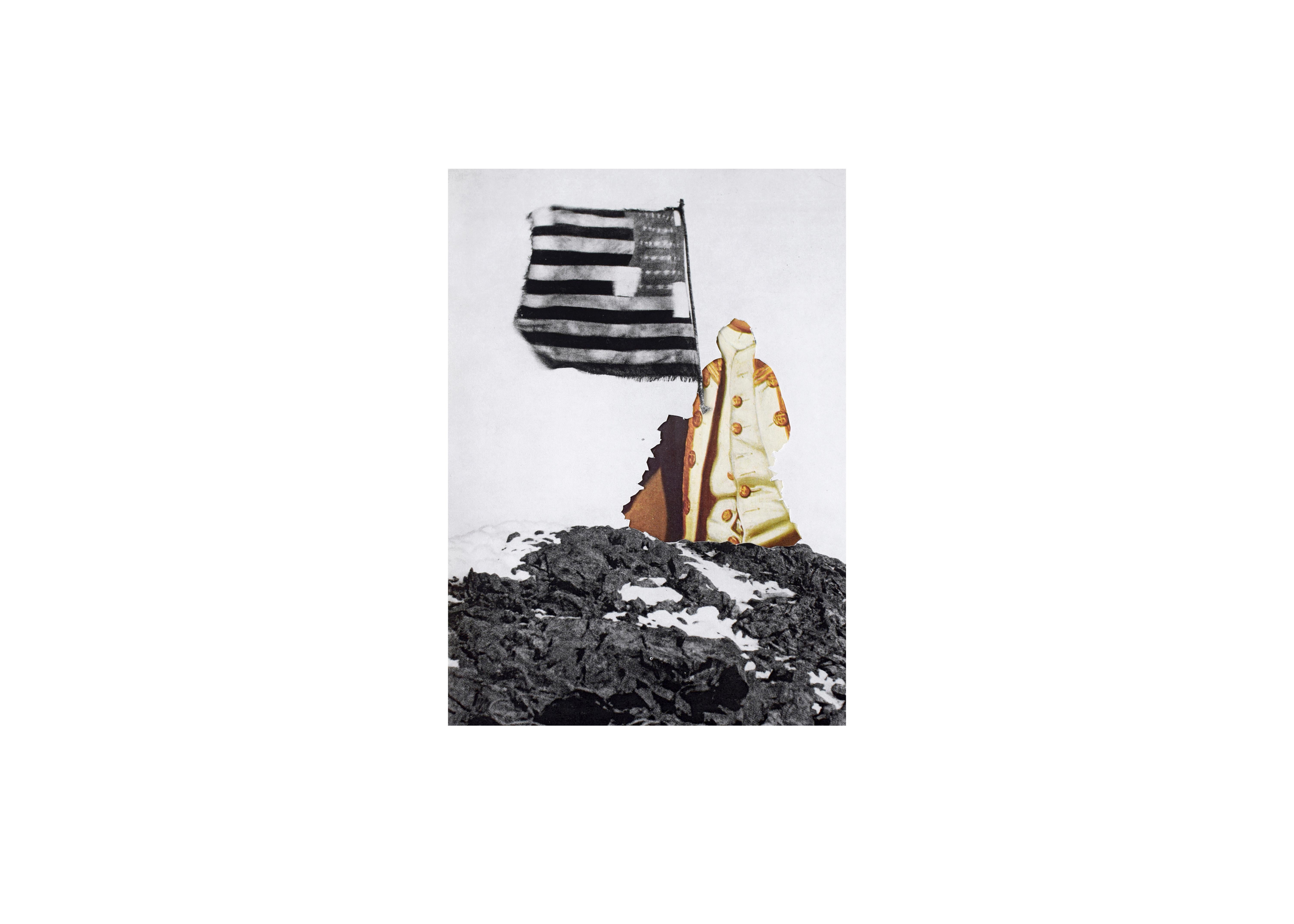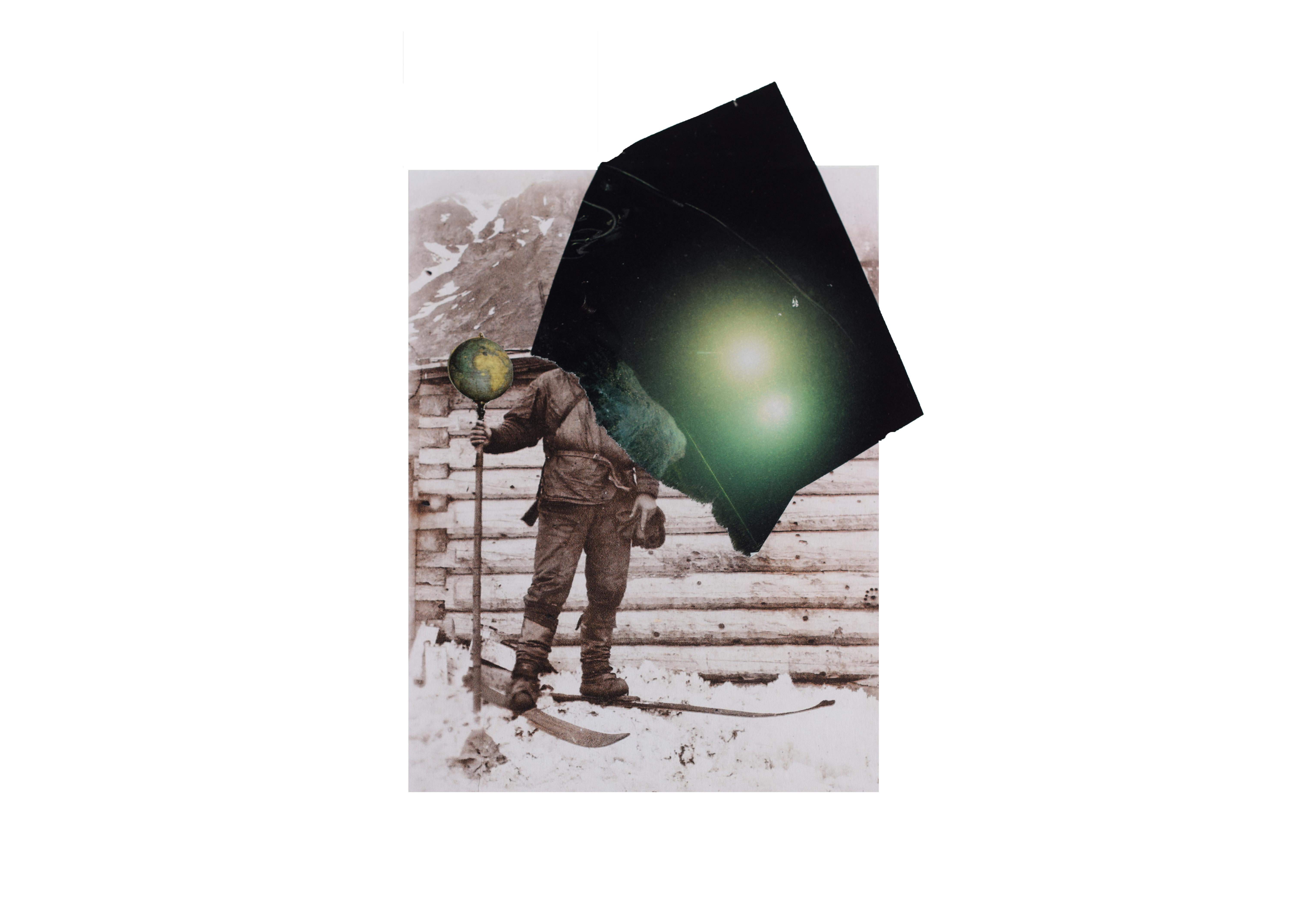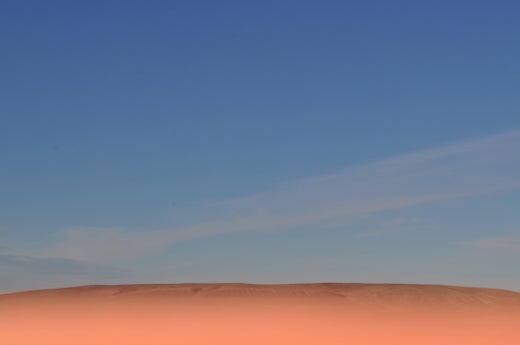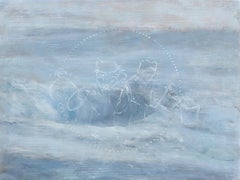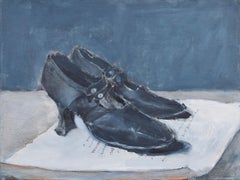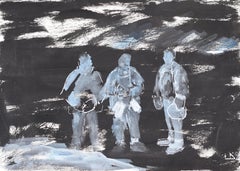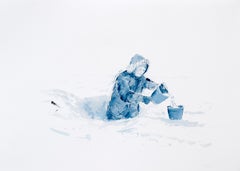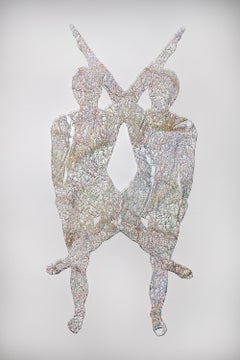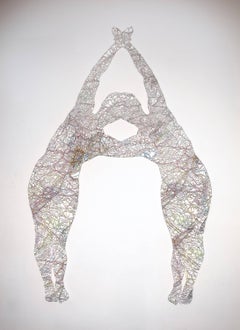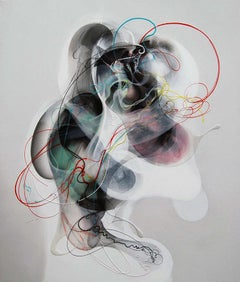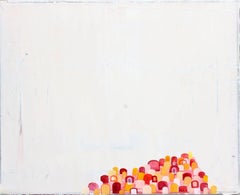Want more images or videos?
Request additional images or videos from the seller
1 of 2
Jessica HoustonFootprints2022
2022
$1,400
£1,085.78
€1,234.52
CA$1,997.52
A$2,180.12
CHF 1,145.05
MX$26,478.55
NOK 14,368.25
SEK 13,484.20
DKK 9,218.74
About the Item
A group of figures heads for icy distant mountains. A familiar enough scene of polar explorers hauling their sledges. Yet somehow this does not quite fit the heroic mold. The ice and sky are tinged a movie musical pale blue and their gear is a bit too colorful for the era of man-hauling. And then there’s the sled, piled high not with boxes of supplies but with a jumbled heap of antiquities: Greek Athenas, bits of a coliseum, a ship’s great wheel. In Jessica Houston’s collage “The Long Haul,” the explorers drag history itself into the great beyond, their backs turned from their absurd load. But we take in the entire scene.
In her suite of works, Over the Edge of the World, Houston uses oil on wood, ink on paper, and collages of found images, many from National Geographic Magazine, to rearrange the evidence – and thus history’s possibilities.
Houston joins visual artists such as Judit Hersko, Katja Aglert, and Isaac Julien who have been inspired by the explorers of the past. Like them, she draws, in part, on the singular tradition of polar exploration narratives as well as fictions such as Ursula Le Guin’s “Sur” (1981), a utopian feminist hoax in which a party of South American women reach the South Pole in 1909, two years before the official arrival of European explorers. Le Guin’s explorers do not feel compelled to leave any written record or physical proof of their presence at the South Pole. If Le Guin’s women might have made it, what other traces have been missed?
Collage can work alongside alternative history: it interprets, interrupts, and rearranges. It questions the completed whole, instead emphasizing composition and relation. Collage suggests it all might be … otherwise. Houston’s collages flaunt their second nature. Yet what they show remains somehow plausible. You want to believe what you’re beginning to see.
In “A life Attuned to Larger Rhythms” Houston grids out rectangles of captured images to overwhelm the eye as the polar environment itself might (whiteout is a paradoxical species of optical overstimulation). Through the strangely ordered confusion of an ice survey grafted atop a chessboard, the mind begins to recognize new connections, emergent shapes: a different future? In “Launching Strategy” a yellow-orange pyramid balances garishly atop a tent. Which came first, the realist tent or the Platonic shape? Can we ever be sure that we’re not already seeing through premade abstractions? Or is it that baggage we’ve been dragging along?
In “Architecture of the Anthropocene” and “Red Blood, Red Earth” Houston reroutes visually symbolic through-lines between women and non-European people and the official history in which they appear dimly or not at all. A full-skirted woman holds onto the tether of a kite that seems to pull her upwards towards a weather balloon floating above an Antarctic base’s radio tower; a row of tropical workers wielding pickaxes folds into the trajectory of a sailor aiming a bow and arrow at an iceberg stained with red. These are not people or images normally associated with polar discovery. But shouldn’t they matter?
“Territory Over Land” strips in a scene from a painted depiction of the tropics, possibly from one of Captain James Cook’s circumnavigations. “Captain Cook’s Legacy” more directly confronts an official portrait of Cook with the torn-in eyes from what can only be described as the explorer’s anonymous dark Other. The hybrid portrait is a kind of contact zone. “Henson and Peary – Past Entanglements” is a cooler, less volatile twin portrait of disputed discoverer of the North Pole Robert Peary and his African-American second in command, Mathew Henson, who was consistently erroneously referred to as Peary’s “manservant.”
Houston re-mystifies polar landscapes that have become through tourism and even the most well-meaning nature documentaries too familiar, too smooth and clean, replete with aesthetically pleasing icebergs and bright icescapes under perfect blue skies. But the poles have 6 months of darkness too. Houston deepens and complicates received images, but without reviving heroic dramas of survival against a blank, enemy ice. The ice in the “Sur” paintings is grimy, oily, swirling with evocations of masted ships swallowed up in dark seas. History is a risk. Survival is not guaranteed.
- Creator:Jessica Houston (1970, American)
- Creation Year:2022
- Dimensions:Height: 10 in (25.4 cm)Width: 14 in (35.56 cm)
- Medium:
- Movement & Style:
- Period:
- Condition:
- Gallery Location:Montreal, CA
- Reference Number:1stDibs: LU47610875842
Jessica Houston
Jessica Houston (MA, Columbia University) has traveled from pole to pole, using color and light to entangle and provoke questions related to our changing natural world, and our nature within it. She has created site-specific works for the NJ MOCA (NJ); the Castello di Corigliano (Puglia, Italy); and The Albany Airport (Albany, NY). Select exhibitions include Art Mûr Gallery, Montréal, Canada; The Hyde Collection Museum, Glens Falls, NY; and The Latimer House Museum, New York, NY. She has been invited to residencies at The Albers Foundation and CAMAC Center for Art, Science and Technology in France. Her works are funded by The Canada Council for the Arts and are in the collections of La collection Prêt d’œuvres d’art, Musée National Des Beaux-Arts du Quebec; Bibliothèque et Archives nationales du Québec (BAnQ), Montréal, Québec; Bank of Montréal, Toronto; and the Consulate General of Monaco, Montréal. She has lectured at The Art Institute of Florence; Columbia University; Concordia University; and OCAD University.
About the Seller
5.0
Vetted Professional Seller
Every seller passes strict standards for authenticity and reliability
Established in 1996
1stDibs seller since 2014
105 sales on 1stDibs
Typical response time: <1 hour
- ShippingRetrieving quote...Shipping from: Montreal, Canada
- Return Policy
Authenticity Guarantee
In the unlikely event there’s an issue with an item’s authenticity, contact us within 1 year for a full refund. DetailsMoney-Back Guarantee
If your item is not as described, is damaged in transit, or does not arrive, contact us within 7 days for a full refund. Details24-Hour Cancellation
You have a 24-hour grace period in which to reconsider your purchase, with no questions asked.Vetted Professional Sellers
Our world-class sellers must adhere to strict standards for service and quality, maintaining the integrity of our listings.Price-Match Guarantee
If you find that a seller listed the same item for a lower price elsewhere, we’ll match it.Trusted Global Delivery
Our best-in-class carrier network provides specialized shipping options worldwide, including custom delivery.More From This Seller
View AllShe dug out one more cell...
By Jessica Houston
Located in Montreal, Quebec
“She dug out one more cell just under the ice surface, leaving nearly a transparent sheet of ice like a greenhouse roof; and there, alone, she worked at sculptures...
Category
2010s Contemporary Mixed Media
Materials
Oil, Wood Panel
A summary report...
By Jessica Houston
Located in Montreal, Quebec
“A SUMMARY REPORT OF THE YELCHO EXPEDITION TO THE ANTARCTIC, 1909-1910. Although I have no intention of publishing this report, I think it would be nice if a grandchild of mine, or somebody’s grandchild, happened to find it some day; so I shall keep it in the leather trunk in the attic, along with Rosita’s christening dress and Juanito’s silver rattle and my wedding shoes...
Category
2010s Contemporary Mixed Media
Materials
Oil, Wood Panel
The Fatigue of the Conquest
By Jessica Houston
Located in Montreal, Quebec
A group of figures heads for icy distant mountains. A familiar enough scene of polar explorers hauling their sledges. Yet somehow this does not quite fit the heroic mold. The ice and sky are tinged a movie musical pale blue and their gear is a bit too colorful for the era of man-hauling. And then there’s the sled, piled high not with boxes of supplies but with a jumbled heap of antiquities: Greek Athenas, bits of a coliseum, a ship’s great wheel. In Jessica Houston’s collage “The Long Haul,” the explorers drag history itself into the great beyond, their backs turned from their absurd load. But we take in the entire scene.
In her suite of works, Over the Edge of the World, Houston uses oil on wood, ink on paper, and collages of found images, many from National Geographic Magazine, to rearrange the evidence – and thus history’s possibilities.
Houston joins visual artists such as Judit Hersko, Katja Aglert, and Isaac Julien who have been inspired by the explorers of the past. Like them, she draws, in part, on the singular tradition of polar exploration narratives as well as fictions such as Ursula Le Guin’s “Sur” (1981), a utopian feminist hoax in which a party of South American women reach the South Pole in 1909, two years before the official arrival of European explorers. Le Guin’s explorers do not feel compelled to leave any written record or physical proof of their presence at the South Pole. If Le Guin’s women might have made it, what other traces have been missed?
Collage can work alongside alternative history: it interprets, interrupts, and rearranges. It questions the completed whole, instead emphasizing composition and relation. Collage suggests it all might be … otherwise. Houston’s collages flaunt their second nature. Yet what they show remains somehow plausible. You want to believe what you’re beginning to see.
In “A life Attuned to Larger Rhythms” Houston grids out rectangles of captured images to overwhelm the eye as the polar environment itself might (whiteout is a paradoxical species of optical overstimulation). Through the strangely ordered confusion of an ice survey grafted atop a chessboard, the mind begins to recognize new connections, emergent shapes: a different future? In “Launching Strategy” a yellow-orange pyramid balances garishly atop a tent. Which came first, the realist tent or the Platonic shape? Can we ever be sure that we’re not already seeing through premade abstractions? Or is it that baggage we’ve been dragging along?
In “Architecture of the Anthropocene” and “Red Blood, Red Earth” Houston reroutes visually symbolic through-lines between women and non-European people and the official history in which they appear dimly or not at all. A full-skirted woman holds onto the tether of a kite that seems to pull her upwards towards a weather balloon floating above an Antarctic base’s radio tower; a row of tropical workers wielding pickaxes folds into the trajectory of a sailor aiming a bow and arrow at an iceberg stained with red. These are not people or images normally associated with polar discovery. But shouldn’t they matter?
“Territory Over Land” strips in a scene from a painted depiction of the tropics, possibly from one of Captain James Cook’s circumnavigations. “Captain Cook’s Legacy” more directly confronts an official portrait of Cook with the torn-in eyes from what can only be described as the explorer’s anonymous dark Other. The hybrid portrait is a kind of contact zone. “Henson and Peary – Past Entanglements” is a cooler, less volatile twin portrait of disputed discoverer of the North Pole Robert Peary...
Category
2010s Contemporary Mixed Media
Materials
Ink, Archival Paper
Drawing in Water
By Jessica Houston
Located in Montreal, Quebec
A group of figures heads for icy distant mountains. A familiar enough scene of polar explorers hauling their sledges. Yet somehow this does not quite fit the heroic mold. The ice and sky are tinged a movie musical pale blue and their gear is a bit too colorful for the era of man-hauling. And then there’s the sled, piled high not with boxes of supplies but with a jumbled heap of antiquities: Greek Athenas, bits of a coliseum, a ship’s great wheel. In Jessica Houston’s collage “The Long Haul,” the explorers drag history itself into the great beyond, their backs turned from their absurd load. But we take in the entire scene.
In her suite of works, Over the Edge of the World, Houston uses oil on wood, ink on paper, and collages of found images, many from National Geographic Magazine, to rearrange the evidence – and thus history’s possibilities.
Houston joins visual artists such as Judit Hersko, Katja Aglert, and Isaac Julien who have been inspired by the explorers of the past. Like them, she draws, in part, on the singular tradition of polar exploration narratives as well as fictions such as Ursula Le Guin’s “Sur” (1981), a utopian feminist hoax in which a party of South American women reach the South Pole in 1909, two years before the official arrival of European explorers. Le Guin’s explorers do not feel compelled to leave any written record or physical proof of their presence at the South Pole. If Le Guin’s women might have made it, what other traces have been missed?
Collage can work alongside alternative history: it interprets, interrupts, and rearranges. It questions the completed whole, instead emphasizing composition and relation. Collage suggests it all might be … otherwise. Houston’s collages flaunt their second nature. Yet what they show remains somehow plausible. You want to believe what you’re beginning to see.
In “A life Attuned to Larger Rhythms” Houston grids out rectangles of captured images to overwhelm the eye as the polar environment itself might (whiteout is a paradoxical species of optical overstimulation). Through the strangely ordered confusion of an ice survey grafted atop a chessboard, the mind begins to recognize new connections, emergent shapes: a different future? In “Launching Strategy” a yellow-orange pyramid balances garishly atop a tent. Which came first, the realist tent or the Platonic shape? Can we ever be sure that we’re not already seeing through premade abstractions? Or is it that baggage we’ve been dragging along?
In “Architecture of the Anthropocene” and “Red Blood, Red Earth” Houston reroutes visually symbolic through-lines between women and non-European people and the official history in which they appear dimly or not at all. A full-skirted woman holds onto the tether of a kite that seems to pull her upwards towards a weather balloon floating above an Antarctic base’s radio tower; a row of tropical workers wielding pickaxes folds into the trajectory of a sailor aiming a bow and arrow at an iceberg stained with red. These are not people or images normally associated with polar discovery. But shouldn’t they matter?
“Territory Over Land” strips in a scene from a painted depiction of the tropics, possibly from one of Captain James Cook’s circumnavigations. “Captain Cook’s Legacy” more directly confronts an official portrait of Cook with the torn-in eyes from what can only be described as the explorer’s anonymous dark Other. The hybrid portrait is a kind of contact zone. “Henson and Peary – Past Entanglements” is a cooler, less volatile twin portrait of disputed discoverer of the North Pole Robert Peary...
Category
2010s Contemporary Mixed Media
Materials
Ink, Archival Paper
Mine At Last
By Jessica Houston
Located in Montreal, Quebec
A group of figures heads for icy distant mountains. A familiar enough scene of polar explorers hauling their sledges. Yet somehow this does not quite fit the heroic mold. The ice and...
Category
2010s Contemporary Mixed Media
Materials
Archival Paper, Magazine Paper
Ghost in the Land
By Jessica Houston
Located in Montreal, Quebec
A group of figures heads for icy distant mountains. A familiar enough scene of polar explorers hauling their sledges. Yet somehow this does not quite fit the heroic mold. The ice and...
Category
2010s Contemporary Mixed Media
Materials
Archival Paper, Magazine Paper
You May Also Like
Untitled (Merged III)
By Nikki Rosato
Located in New Orleans, LA
medium: hand cut road map
Nikki Rosato earned her MFA from the School of the Museum of Fine Arts, Boston in 2013. Prior to studying at SMFA, Rosato received a Bachelor of Arts deg...
Category
21st Century and Contemporary Contemporary Mixed Media
Untitled (Merged) V
By Nikki Rosato
Located in New Orleans, LA
medium: hand cut road map
Nikki Rosato earned her MFA from the School of the Museum of Fine Arts, Boston in 2013. Prior to studying at SMFA, Rosato received a Bachelor of Arts deg...
Category
21st Century and Contemporary Contemporary Mixed Media
Empathy II
Located in New York, NY
Mixed media
Category
21st Century and Contemporary Contemporary Mixed Media
Materials
Pigment, Mixed Media, Resin, Oil
Untitled # 7
By A.J. Fries
Located in Buffalo, NY
A contemporary oil painting on linen by American artist A.J. Fries.
Artist’s Statement:
These works are an extension of a small series of realistic paintings that I did of graves...
Category
21st Century and Contemporary Contemporary Figurative Paintings
Materials
Linen, Oil
Untitled (Merged I)
By Nikki Rosato
Located in New Orleans, LA
medium: hand cut road map
Nikki Rosato earned her MFA from the School of the Museum of Fine Arts, Boston in 2013. Prior to studying at SMFA, Rosato received a Bachelor of Arts deg...
Category
21st Century and Contemporary Contemporary Mixed Media
Measureless to Man
Located in Columbia, MO
Hannah Reeves (American, b. 1981)
Hannah Reeves is a Missouri native and holds an MFA in fibers from the University of Missouri. Her work explores themes of memory and the passage of...
Category
21st Century and Contemporary Abstract Mixed Media
Materials
Fabric, Thread, Acrylic
